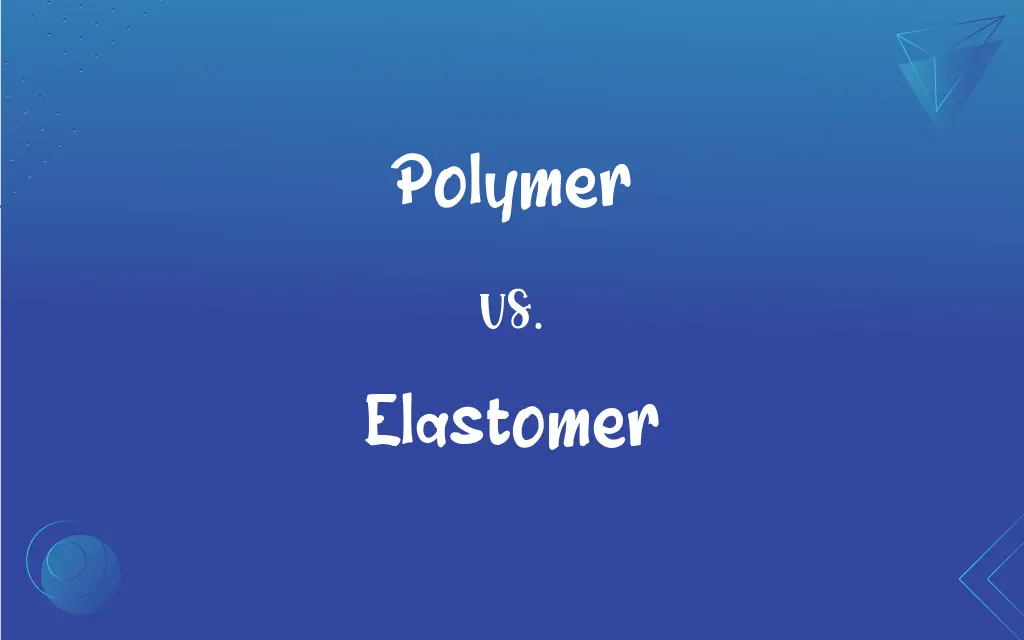Polymer vs. Elastomer: What's the Difference?
Edited by Aimie Carlson || By Harlon Moss || Updated on October 25, 2023
A polymer is a large molecule composed of repeating subunits, while an elastomer is a type of polymer that can be stretched and return to its original shape without permanent deformation.

Key Differences
Polymers are macromolecules formed by linking together small molecules called monomers. This process of formation is known as polymerization. The versatility and adaptability of polymers make them a fundamental component in a plethora of applications. In contrast, elastomers represent a subset within the polymer category. These specific polymers are known for their elasticity, allowing them to stretch and revert back to their original form.
Elastomers derive their name from the inherent elastic properties they possess. These properties enable elastomers to undergo significant deformation when under stress but recover when the stress is removed. Polymers, on the other hand, can vary in their properties; some might be rigid, while others might be flexible, depending on their chemical composition.
The expansive world of polymers encompasses a range of materials from plastics to fibers to rubbers. Polymers can be natural, like DNA and cellulose, or synthetic, like nylon and polyethylene. Elastomers, residing within the polymer family, include materials like natural rubber, silicone, and certain synthetic rubbers.
An easy analogy to distinguish between a polymer and an elastomer would be to consider the relationship between squares and rectangles in geometry. Just as all squares are rectangles but not all rectangles are squares, all elastomers are polymers, but not all polymers are elastomers.
Comparison Chart
Definition
A large molecule made of repeating subunits.
A polymer that can stretch and return to its original shape.
ADVERTISEMENT
Elasticity
Varies, not all polymers are elastic.
Characteristically elastic.
Examples
DNA, cellulose, nylon.
Natural rubber, silicone.
Formation
Through polymerization of monomers.
Through specific types of polymerization.
Range of Properties
Can be rigid, flexible, semi-crystalline, amorphous, etc.
Generally soft and deformable.
Polymer and Elastomer Definitions
Polymer
A large molecule composed of repeating monomeric units.
Polyethylene is a widely used polymer in packaging.
ADVERTISEMENT
Elastomer
A polymer with the ability to return to its original shape post-deformation.
The elastomer in the shoe sole provides comfort and bounce.
Polymer
A material with properties dependent on its molecular structure and size.
The polymer's crystallinity determined its strength and flexibility.
Elastomer
A rubbery material known for its elasticity.
Car tires are often made of various elastomers to ensure durability and grip.
Polymer
A macromolecule that can be natural or synthetic.
Cellulose, a natural polymer, is abundant in plant cell walls.
Elastomer
A type of polymer that can undergo significant stretching.
The elastomer's ability to stretch makes it ideal for bands and straps.
Polymer
A substance whose properties can range from elastomeric to rigid.
Depending on its formulation, a polymer can be as flexible as rubber or as hard as glass.
Elastomer
A material that resists permanent deformation under stress.
Elastomer seals are used in machinery due to their resilience.
Polymer
A substance created through polymerization.
The creation of the polymer nylon revolutionized the textile industry.
Elastomer
A polymer subset primarily used where flexibility and resilience are crucial.
Medical gloves made from elastomers offer both flexibility and protection.
Polymer
Any of numerous natural and synthetic compounds of usually high molecular weight consisting of up to millions of repeated linked units, each a relatively light and simple molecule.
Elastomer
Any of various polymers having the elastic properties of natural rubber.
Polymer
(organic chemistry) A long or larger molecule consisting of a chain or network of many repeating units, formed by chemically bonding together many identical or similar small molecules called monomers. A polymer is formed by polymerization, the joining of many monomer molecules.
Elastomer
Any polymer having the elastic properties of rubber
Polymer
A material consisting of such polymer molecules.
Elastomer
Any of various elastic materials that resemble rubber (resumes its original shape when a deforming force is removed)
Polymer
Any one of two or more substances related to each other by polymerism; specifically, a substance produced from another substance by chemical polymerization.
Polymer
A naturally occurring or synthetic compound consisting of large molecules made up of a linked series of repeated simple monomers
FAQs
How are polymers formed?
Polymers are formed through a process called polymerization.
Why are elastomers important?
Elastomers are crucial for applications requiring materials to stretch and recover, like rubber bands or seals.
What is a polymer?
A polymer is a large molecule composed of repeating monomeric units.
How does an elastomer differ from other polymers?
An elastomer is a type of polymer known for its elasticity and ability to return to its original shape.
Can a polymer be naturally occurring?
Yes, polymers can be both natural, like DNA, or synthetic, like nylon.
Are all elastomers synthetic?
No, some elastomers, like natural rubber, are naturally occurring.
Are plastics considered polymers?
Yes, plastics are a type of synthetic polymer.
What's a common example of an elastomer in daily life?
A common example of an elastomer in daily life is a rubber band.
Can polymers be biodegradable?
Yes, some polymers, especially certain natural ones, are biodegradable.
Why are polymers used in packaging?
Polymers are used in packaging due to their versatility, durability, and barrier properties.
How are elastomers made?
Elastomers are made through specific types of polymerization processes, often involving certain catalysts.
Can polymers conduct electricity?
Typically, polymers are insulators, but conductive polymers can be engineered to conduct electricity.
What determines the properties of a polymer?
The properties of a polymer are determined by its molecular structure, size, and the type of monomers used.
Are there limits to how much an elastomer can stretch?
Yes, while elastomers are stretchy, they have limits beyond which they can break or get deformed.
How can elastomers be strengthened?
Elastomers can be strengthened or modified using additives, fillers, or through chemical modifications.
Are all polymers safe for human use?
Not all polymers are safe for every application, and their safety depends on their chemical composition and the intended use.
Is latex an elastomer?
Yes, latex, especially natural latex, is an elastomer known for its high elasticity.
Is silicone an elastomer?
Yes, silicone is a type of synthetic elastomer known for its flexibility and resistance to heat.
Can elastomers be recycled?
Some elastomers can be recycled, while others are more challenging to process.
What are the applications of polymers?
Polymers have a vast range of applications, from packaging materials to textiles to medical devices.
About Author
Written by
Harlon MossHarlon is a seasoned quality moderator and accomplished content writer for Difference Wiki. An alumnus of the prestigious University of California, he earned his degree in Computer Science. Leveraging his academic background, Harlon brings a meticulous and informed perspective to his work, ensuring content accuracy and excellence.
Edited by
Aimie CarlsonAimie Carlson, holding a master's degree in English literature, is a fervent English language enthusiast. She lends her writing talents to Difference Wiki, a prominent website that specializes in comparisons, offering readers insightful analyses that both captivate and inform.
































































